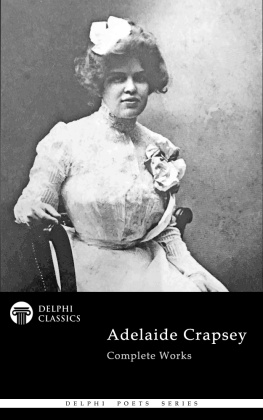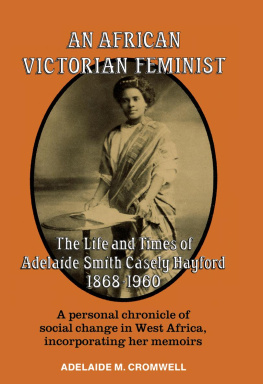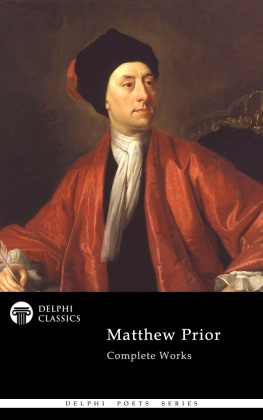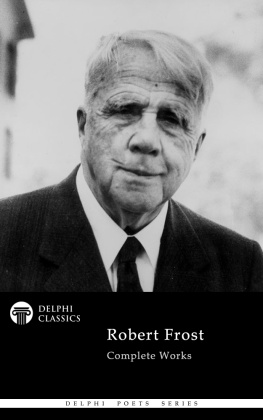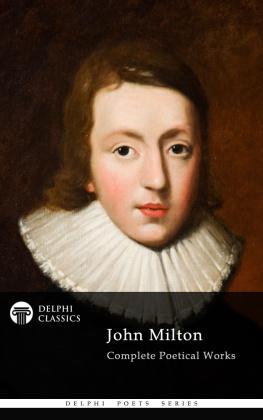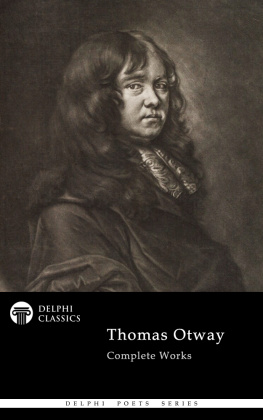

Adelaide Crapsey
(1878-1914)

Contents
Delphi Classics 2019
Version 1









Browse the entire series


Adelaide Crapsey

By Delphi Classics, 2019
COPYRIGHT
Adelaide Crapsey - Delphi Poets Series
First published in the United Kingdom in 2019 by Delphi Classics.
Delphi Classics, 2019.
All rights reserved. No part of this publication may be reproduced, stored in a retrieval system, or transmitted, in any form or by any means, without the prior permission in writing of the publisher, nor be otherwise circulated in any form other than that in which it is published.
ISBN: 978 1 91348 703 4
Delphi Classics
is an imprint of
Delphi Publishing Ltd
Hastings, East Sussex
United Kingdom
Contact: sales@delphiclassics.com

www.delphiclassics.com
NOTE

When reading poetry on an eReader, it is advisable to use a small font size and landscape mode, which will allow the lines of poetry to display correctly.
The Life and Poetry of Adelaide Crapsey

Brooklyn Heights, New York, 1856 Crapseys birthplace

Brooklyn Heights today

Crapsey, c. 1905
Brief Introduction: Adelaide Crapsey by Claude Bragdon

A DELAIDE CRAPSEY, daughter of Algernon Sidney and Adelaide Trowbridge Crapsey, was born on the ninth of September, 1878. She died in her thirty-sixth year on October the eighth, 1914. Her young girlhood was spent in Rochester, New York, where her eminent father was rector of St. Andrews Parish. At fourteen she entered the preparatory school of Kemper Hall, Kenosha, Wisconsin, from which school she graduated at the head of her class, in 1897. She entered Vassar College the same year, graduating with the class of 1901.
Two years after her graduation she began her work as a teacher of History and Literature, in Kemper Hall. In 1905 she went abroad and became a student in the School of Archaeology in Rome. The following year she assumed the position of instructor in Literature and History in Miss Lowes Preparatory School in Stamford, Conn., but in 1908 on account of failing health she was compelled to abandon teaching for a time. The two succeeding years she spent in Italy and England, working on her Analysts of English Metrics an exhaustive scientific thesis relating to accent which years before she had planned to accomplish as her serious life work.
In 1911 she returned to America and became instructor in Poetics at Smith College. The double burden of teaching and writing proved too much for her frail constitution, and in 1913, gravely ill, she was obliged to abandon definitely and finally both activities. The rest is a silence broken only by the remarkable verses of her last poetic phase.
These are the bare biographical facts in the life of Adelaide Crapsey, but it would be an injustice to the reader not to attempt to render some sense of her personality, all compounded of beauty, mystery and charm. I remember her as fair and fragile, in action swift, in repose still; so quick and silent in her movements that she seemed never to enter a room but to appear there, and on the stroke of some invisible clock to vanish as she had come.
Although in Merediths phrase a man and a woman both for brains, she was an intensely feminine presence. Perfection was the passion of her life, and as one discerns it in her verse, one marked it also in her raiment. In the line
And know my tear-drenched veil along the grass.
I see again her drooping figure with some trail of gossamer bewitchment clinging about or drifting after her. Although her body spoke of a fastidious and sedulous care in keeping with her essentially aristocratic nature, she was merciless in the demands she made upon it, and this was the direct cause of her loss of health. The keen and shining blade of her spirit too greatly scorned its scabbard the body, and for this she paid the uttermost penalty.
Her death was tragic. Full of the desire of life she yet was forced to go, leaving her work all unfinished. Her last year was spent in exile at Saranac Lake. From her window she looked down on the graveyard Trudeaus Garden, she called it, with grim-gay irony. Here, forbidden the work her metrical study entailed, these poems grew flowers of a battlefield of the spirit. But of her passionate revolt against the mandate of her destiny she spared her family and friends even a sign. When they came to cheer and comfort her it was she who brought them cheer and comfort. With magnificent and appalling courage she gave forth to them the humor and gaiety of her unclouded years, saving them even beyond the end from knowledge of this beautiful and terrible testament of a spirit all unreconciled, flashing unquenched defiance to the stars.
This collection of her verse is of her own choosing, arranged and prepared by her own hand. She wrote gay verse in the earlier days before the shadow fell upon her, but her rigorous regard for unity banished it from this record of the fearful questioning of her spirit.
Next page
